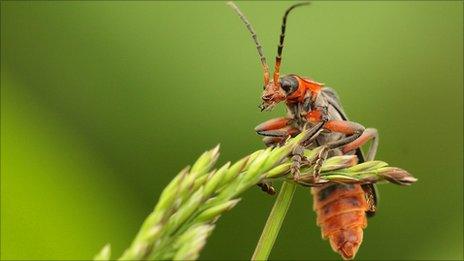Insects proving food for thought at Swansea University
- Published

Large beetles, crickets and locusts are being bred in the Netherlands as a potential food source. Photo: Greg Hitchcock
An insect summit is aiming to revolutionise the way we think about bugs as a sustainable source of food.
It is estimated 80% of the world's population include some sort of insect in their diet.
Yet in the west, the idea is confined to reality TV shows like I'm A Celebrity.
The Royal Entomology Society conference at Swansea University will hear insect protein may be key to alleviating famine.
One man is on a mission to give us the taste for creepy-crawlies.
Professor Arnold van Huis from Wageningen University in the Netherlands is a consultant for the United Nations' Food and Agriculture Organisation.
He said: "Producing a kilogram of meat from a cow requires 13kg of vegetable matter as feed.
"Yet 1kg of meat from a cricket, locust or beetle needs just 1.5 to 2kg of fodder, and produces a fraction of the CO2 emissions.
"The maths are quite simple. On average, in the west, we eat 120kg of meat per person. China is currently at 80kg per head and catching us up fast.
"If five billion people eat 100kg of beef or pork, then we'll need to grow an average of 6.5 trillion kilograms of fodder per year.
"There just isn't enough space or nutrients in the earth to support that and the poorest people will simply starve to death.
"The good news is that, not only do insects require less food to farm, you also don't have to eat as much to survive, as they are an extremely good source of protein and vitamins."
Thailand has 15,000 household cricket farms bred for human consumption.
In southern Africa, the Mopane worm industry is worth $85 million, and is an important source of protein for the indigenous population.
The insects are harvested from the Mopane trees that they use as their habitat.
In the Netherlands, insect rearing companies are already in business, typically they tend to breed large beetles, crickets and locusts.
Locusts have to be farmed at 30 degrees, so this may be the main reason why insects are not eaten in the western world to the same extent.
However Professor van Huis said the most common misconception was that they were not tasty.
'Western palates'
"Because of the mild climate, we're just not culturally used to eating insects, but, if they're cooked correctly, they can be delicious," he added.
"Really there's no credible reason against eating them, taste-wise and nutritionally, there's no difference between insect meat and that from birds, fish or mammals.
"But in an attempt to combat the developed world's squeamishness, we're looking at ways of grinding the meat into some sort of patty, which would be more recognisable to western palates.
"It's also possible, though not yet commercially viable, to extract the protein, and produce a kind of meat substitute, similar to the Quorn products we're already used to."
On health grounds Professor Van Huis warns against going down The Good Life route, and harvesting your own bugs in the back garden.
Swansea University was chosen to host the summit in recognition of its ground-breaking work in the field.
Amongst the home-grown breakthroughs being unveiled this week is pioneering research showing that Green Bottle larvae can be used to fight hospital-acquired MRSA infections.
The three day conference will also hear a presentations on Nasa's fruit fly studies, which shed new light on the effects of radiation during prolonged space travel.
It's hoped that their findings could lead to better protection for astronauts on any future mission to Mars.